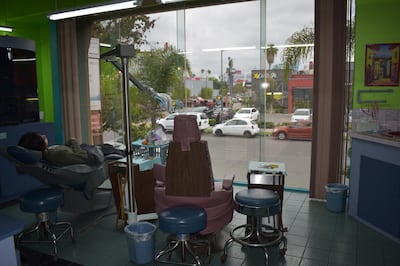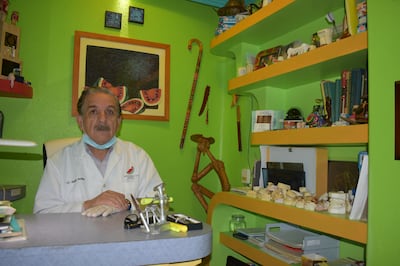The San Ysidro border crossing in southern California is a busy one – harried border guards wave through crowds of people chattering in Spanish and English as customs officials riffle through their bags.
And while many of those crossing are simply returning home after a long day of work in the US, many others are crossing for another purpose: health care.
On exiting the US, pedestrians making this crossing come face to face with a large pharmacy. About 50 metres from that – a full-service hospital. Along the busy roads snaking out from the border crossing are dozens upon dozens of medical and dental clinics, many with prominent signs in English.
All are catering to a surge in medical tourism brought about by the soaring cost of health care in the US, which pushes millions of people across the Mexican border every year in search of cheaper options.
The US spends about twice as much on health care as other industrialised nations, frequently with worse outcomes, as insurance middle men, hospital bureaucracies and other administrative costs siphon money away from patient care.
'Insurance doesn't do a lot of things'
Ahmed Abu, originally from Kenya, has lived in San Diego for about 20 years.
Read More
Mexican cartels recruiting US soldiers and other Americans for their dirty work
'Three Amigos' Summit in Mexico takes on migration and fentanyl crises
“I've been going almost, like, 15 years going back and forth to TJ [Tijuana] doing every kind of thing, even taking people there for medical reasons,” Mr Abu tells The National. “I go myself also for fixing my glasses, for the dentist.
“I have health insurance, but this health insurance doesn't do a lot of things.”
As a taxi driver, he has ferried many Californians as well as other people from across the US travelling to Mexico for medical purposes.
About 9 per cent of Americans have no health insurance, and even those with good coverage are often subject to high “co-pays” and deductibles that add thousands of dollars to costs.
Additionally, insurance companies can refuse to cover certain treatments deemed to be “elective”, such as orthodontic care, meaning that millions of Americans must either pay out of pocket or go without care.
In 2021, Americans paid about $433 billion for out-of-pocket medical and dental services.

Mexico, meanwhile, offers private services at much cheaper rates. The roughly one million Americans that travel to Mexico every year save between 40 per cent to 65 per cent on medical and dental procedures, according to Patients Without Borders.
And gaining access to this care is relatively easy – Americans only need a valid passport to enter Mexico on a six-month visa. The Tijuana government also offers passes that allow medical tourists to enter the country via a special lane, expediting the immigration process.
Adina Smith, a long-time resident of San Diego, has travelled to Tijuana several times for dental services.
“I know of about seven people that go [regularly],” she says. “I had heard from my friend what a great experience she had and the affordability of it.
“I had a great impression about the service that I received. The office was very clean and the dentist had great equipment, I never got an infection or anything like that. My dentist and the assistants spoke great English.”
Mia Nica, who is uninsured, has crossed into Mexico several times for medical care.
“Even if I did [have insurance], the cost would have been more accessible [in Mexico],” she tells The National.

“Most of my extended family and friends in California and Arizona go to Mexico, for dental work especially.
“They [the healthcare workers] were respectful, professional, the facilities was clean, the procedures clearly explained and the prices straightforward.”
The quality of service in Mexico is generally quite high – aspiring physicians in Mexican institutions face a rigorous preparation process that culminates in an exam to study a speciality.
And as medical school in Mexico costs only a fraction of what it does in the US, some American students looking to train as doctors end up crossing the border.
Eduardo Tanori, a professor at UC San Diego who helps international medical school graduates prepare for US board exams, told ABC 10News that students trained in Mexico have more than a 90 per cent pass rate.
Cost and quality
Dr Sergio Aviles has been practising orthodontics in Tijuana for almost 50 years.
“There is a lot of movement, there is a lot of money, there is a lot of demand”, especially in Tijuana, he tells The National, explaining that not only do healthcare professionals from all over Mexico come to the city to practise, but from all over the world as well.
“The demand [for health care in Mexico] … is basically due to three factors: the price – really, the most important – the language … and the warmth [of treatment],” he says, with this last referring to the bedside manner of Mexican doctors compared to American ones.
In his opinion, the only difference between quality of care in Mexico and the US is technology.
“They [in the US] have high technological quality but in human quality, Mexican medicine – or that of other countries – might be better,” he says.

Dr Sol Klaja, a dentist in Mexico City who treats many American patients every month, agrees.
“The major differences are the use of sedation, the cost and the care,” she adds, saying that the US has an advantage when it comes to technology – but not by much.
“It's the cost and quality of services” that brings Americans to Mexico, she says. The quality is “almost the same, but here is cheaper”.
Dr Francisco Contreras is director, president and chairman of Oasis of Hope Hospital, a cancer treatment centre.
He says that not only do American patients appreciate the warm bedside manner of Mexican doctors, but he also points out that, as malpractice is such a large concern, health professionals in the US are reluctant to explore alternative treatment options.
“A doctor in America is so threatened by lawyers, the patient, they very easily are sued,” Dr Contreras says. “So a doctor talks to the patient or through the patient to the patient's lawyer – and what I mean by that is, especially in cancer, they're gonna give you the worst-case scenario.”
Oasis of Hope and other cancer treatment centres in Tijuana offer alternative approaches to treatment that are either unavailable or not widely used in the US due to Food and Drug Administration restrictions.
“Patients that come from all over the world, especially from Europe or the States, [and] they love that they can actually sit down with a doctor and talk about possibilities of them surviving, and not just that they're going to die,” he says.

Risks
Travelling to Mexico for health care does not come without risks. Undergoing an invasive procedure and then travelling exposes patients to a higher possibility of infection.
In 2019, 11 Americans who had surgery in Tijuana returned home with dangerous antibiotic-resistant infections. Online forums are full of horror stories of quack surgeons flubbing surgery or suspicious generic drugs purchased in sketchy pharmacies causing severe reactions.
And most Mexican border towns, where the highest concentration of medical tourism infrastructure exists, have a high level of criminal activity and violence.
Tijuana is the most dangerous city in Mexico, with 138 homicides per 100,000 people. Mexico as a whole has a homicide rate that is seven times higher than the US, according to the UN.
A group of four Americans seeking health care in Mexico were kidnapped in Matamoros earlier this year. Two were ultimately killed.
Despite this, American medical tourists keep coming.
“At first it can be scary if you don't know your way around and you don't speak the language. However, people are very friendly and everyone I asked help of were more than willing to,” Ms Nica says.
Mr Abu adds: “I never had any issue.
“If you're going there for a medical purpose and you're staying in very nice places, you don't have any issue – no problem.”
Updated: June 28, 2023, 3:00 AM